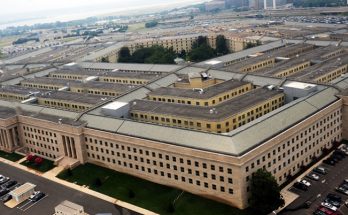The decision by Australia to scrap its $66 billion deal to purchase French-designed submarines in favor of a nuclear-powered option enveloped within a broader three-nation security pact with the U.S. and the United Kingdom sent shockwaves across the world.
Nowhere did those shockwaves resonate more deeply than in France, which only two weeks earlier had issued with Australia a joint communique celebrating the strength of the bilateral cooperation between the two nations. The loss of a major defense contract aside, the disruption of a burgeoning strategic relationship in the Indo-Pacific region stung Paris deeply.
Perhaps even more painful to France was the realization that the United States (and Britain) was aiding Australia not just in orchestrating the submarine procurement alternative, but in redefining defense cooperation through the launch of a new military alliance within the so-called Anglosphere. More to the point, this was all undertaken in secrecy over a period of roughly half a year.
French foreign minister Le Drian, on Biden's surprise nuclear sub deal with Australia: "It's a stab in the back. This unilateral, brutal, unpredictable decision looks a lot like what Trump would do."https://t.co/Sp3nhLFui3
— Olivier Knox (@OKnox) September 16, 2021
For France this amounts to yet another moment of betrayal by an ally, a wound to national pride, and a sense of drift between continental Europe and post-Brexit Britain. As if on cue, French officials emphasized that the Australian decision coupled with American and British backroom secrecy shines light once again on the need for European strategic autonomy.
Of course this is the default view from Paris, where every issue involving sovereign decisions by nations considered French allies is met with official outrage and calls for a European defense pillar (naturally led by France).
But amidst the outcry – and let there be no doubt that French government officials were quick to lash out and (quite hypocritically) accuse Washington of betrayal – there are indeed seeds of truth in the dismay of France.
Foremost is the lack of artful diplomacy vis-à-vis Paris. Yes, the United States, Australia and Britain are entitled to act in their best interests as much as France. And yes, the demise of the submarine deal will impact French naval jobs at multiple levels of the industrial chain (Tier 1, Tier 2, downward).
Certainly had Australia begun its future submarine procurement search from the stance of including nuclear propulsion instead of asking Naval Group to redesign an SSN platform (the Barracuda, or, as the French Navy refers to it, the Suffren class) for conventional purposes the squabbles between the Australian government and the French shipbuilder might not have grown under the weight of unorthodox requirements pitted against false promises.
But there is also the matter of distancing France – an increasingly dependable security partner to Washington and the NATO Alliance since 2007 – from the American efforts to build a strategic counter in the Indo-Pacific to China.
France has military presence in the Indo-Pacific with 7,000 troops stationed in the region, diplomatic reach, a large exclusive economic zone across the Indian and Pacific oceans, a history of defense industrial cooperation with “Quad” (Quadrilateral Security Dialogue) participant India, and an interest in partnering alongside the U.S. and others to ensure continuous freedom of operations through the South China Sea.
Instead, Paris now finds itself sitting outside, once again feeling unwelcome by the Anglosphere club. Those feelings may appear hyper-sensitive to most, but consider the key Five Eyes intelligence-sharing alliance (including Canada and New Zealand) and question why a crucial regional strategic partner such as Japan also finds itself excluded, despite the latter’s security alignment with all participants and own strategic concerns regarding China.
“The 🇺🇸 choice to exclude a 🇪🇺 ally and partner such as 🇫🇷 from a structuring partnership with Australia, at a time when we are facing unprecedented challenges in the Indo-Pacific region (…) shows a lack of coherence that 🇫🇷 can only note and regret.”https://t.co/ruGnJkQAWa
— French Embassy U.S. (@franceintheus) September 16, 2021
But the French, too, are not without blame. The writing was on the wall regarding Australian discontent with the submarine project for far too long for French officials to be shocked by this outcome. Plus, the value placed on its strategic independence from the United States renders it lower in the priority order for Washington than Australia and Britain.
Put simply, Australia’s close strategic ties to the U.S. and Britain outweigh Canberra’s concerns over relations with France. Australia will move even closer to the U.S. under the AUKUS pact, with an opportunity to take leaps in technological sharing in relation to artificial intelligence, quantum technologies and undersea capabilities, while creating synergies with its American and British allies in cybersecurity (an area of ever-growing worry to Canberra).
While the strategic landscape from Australia’s vantage point in 2016 might have appeared less alarming, therefore not prompting reconsideration of the conventional submarine (SSK) acquisition, the actions by China since that time have put Australian officials on notice that the threat from Beijing can no longer be downplayed. With its lengthy sea approaches, Australia’s decision to shift toward an SSN option – provided it receives the requisite help from the U.S. and Britain – makes strategic and operational sense.
Australia will receive extremely sensitive U.S. nuclear-propulsion know-how and increased capability operability with two of its three closest allies (New Zealand being the other), while being part of an ecosystem of submarine design, industry, technology and capability. Canberra will in turn be expected to contribute its fair share to the security partnership as it pertains to all aspects of countering China, including possibly granting more military basing rights to U.S. troops.
Two other questions also arise in the wake of the Australian submarine procurement about-face and the announcement of the AUKUS security partnership.
First, does India – a member of the so-called Quad alongside Australia, Japan and the U.S. – reach out to Washington seeking help with its own design and production project for six SSNs, and if so, does the U.S. agree to provide assistance?
And also, do South Korea and Japan (less likely) now look to design and build their own indigenous nuclear-powered submarines?
Ultimately there is plenty to consider regarding future arrangements and the fallout from the latest news regarding the AUKUS security partnership. The ramifications have yet to unfold.

Dan Darling is Forecast International’s director of military and defense markets. In this role, Dan oversees a team of analysts tasked with covering everything from budgeting to weapons systems to defense electronics and military aerospace. Additionally, for over 17 years Dan has, at various times, authored the International Military Markets reports for Europe, Eurasia, the Middle East and the Asia-Pacific region.
Dan's work has been cited in Defense News, Real Clear Defense, Asian Military Review, Al Jazeera, and Financial Express, among others, and he has also contributed commentary to The Diplomat, The National Interest and World Politics Review. He has been quoted in Arabian Business, the Financial Times, Flight International, The New York Times, Bloomberg and National Defense Magazine.
In addition, Dan has made guest appearances on the online radio show Midrats and on The Media Line, as well as The Red Line Podcast, plus media appearances on France 24 and World Is One News (WION).




